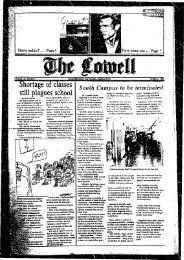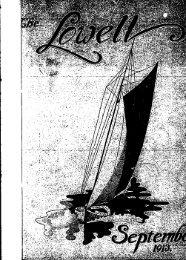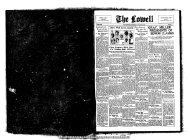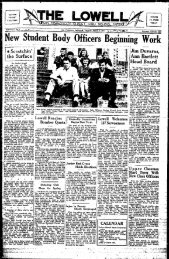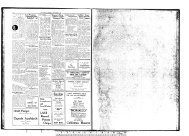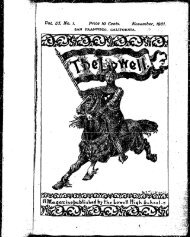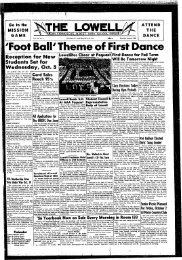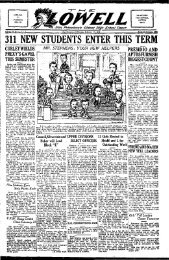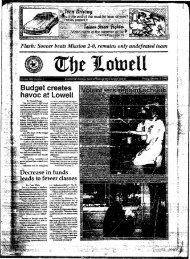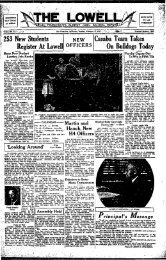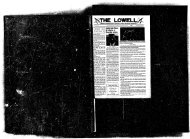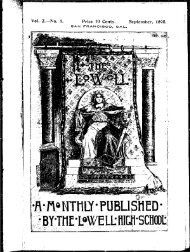Severely handicapped class arrives - The Lowell
Severely handicapped class arrives - The Lowell
Severely handicapped class arrives - The Lowell
You also want an ePaper? Increase the reach of your titles
YUMPU automatically turns print PDFs into web optimized ePapers that Google loves.
7*i- Lmrll. January !>. WSJ. fast 15<br />
.IN DEPTH<br />
-Equality or reverse discrimination?<br />
Student affirmative action programs<br />
Court rulings<br />
change policy<br />
By Irene Kuo<br />
Affirmance action ha.*, been a contnrvental<br />
contr-aponiry iwie, (uv-<br />
, ins been come»ieil in the count on a<br />
.number or e.vastom.<br />
During He 1970's. affirmamc action<br />
polk* a resulted in complaints<br />
that law. medical, and other professional<br />
school* wci -, denying admission<br />
to while applicant* in<br />
preference to minorities.<br />
Seven) major court cave* cnuicd.<br />
the most notable one King ihc<br />
Bakke case.<br />
In Rfffcnts of Uni\tnin ii<br />
California v. BaUr. Allan Paul<br />
r Bakkc. an American of Norwegian<br />
background, won the right M attend<br />
the School or Medicine at Univcnity<br />
of California at Davis.<br />
Bakke was admitted a'mwt »ix<br />
yean after he firrt applied- He had<br />
been rejected mice, dctpitc a grade<br />
point average of 3.M in engineering.<br />
In his urn against the univentty.<br />
he challenged its policy of reserving<br />
16sr^s in its freshman cla\* of<br />
100 for "minority" student* whom<br />
Bakke claimed were less qualified<br />
than he was.<br />
In stale court. Bakke charged that<br />
his civil right* were violated unJer<br />
the 14 Amendment tod Title VI of<br />
UK 1964 Civil Rights Act (the 14 th<br />
Amendment guarantees equal protection<br />
of lawi to all citizens; Title<br />
VI state that no penon can be<br />
discriminated sgainM became of hi*<br />
or her "race, color, or national<br />
origin," under any federally funded<br />
program or institution.)<br />
O.i June 28. 1978. the U. S.<br />
Suprrmc Coun decided Bakke<br />
ibould Le admitted, bu\ upheld the<br />
right of • uoivenity to use raw as a<br />
factor in Mlm i sifoos •<br />
Janice Lewis F. Pmll Jr. iaicd<br />
* ... preferring members o* any one<br />
group for no reason otlicr than race<br />
or ethnic origin is discrimination for<br />
iu own take."<br />
Justice Powell alsn stated that<br />
though attaining i diverse student<br />
body was a "oxs&utionaliy permissible<br />
goal for ui Institution or<br />
higher learning." this goal w*s improper<br />
if achieved through racial or<br />
ethnic quotas: an applicant's origin<br />
was "...but a tingle, though important,<br />
dement.<br />
Other simitar cases followed the<br />
BaUce case. Two of them were dub*<br />
bed "the Russian BV' case" and<br />
the Italian Baike case." However,<br />
t&e two cases resulted in different<br />
rulings.<br />
In the Russian Bakke caw, a<br />
Rauiao-born Jew named Rita Clancy<br />
sued ths medical school at U.C.<br />
Davii, cUiming "..a would have<br />
tees Bdmhtei had not the minorities<br />
program blocked me ind that I was<br />
fflcMfrf became I was white."<br />
Clancy, now married to an<br />
American lawyer, cited her family'*<br />
poverty, ihc fact lha; ihe had received<br />
public avtiuancc. and her deficiency<br />
in Engli\h a* ju\l cautc* Tor<br />
her to be admitted tn one of ilie 16<br />
\pot\ allocated for minoriticv<br />
By tSc ruling of the BaVke ca*e.<br />
Clancy w*\ admitted to the schrtil.<br />
In the Italon BaUc cave, ihc<br />
Supreme Court up-held a lower court<br />
ruing that denied Italian Amc ic»n<br />
Philip F. Di Leo the tight to we the<br />
University of Colorado School of<br />
Law for rejecting hi* application to<br />
its special admtuiom program.<br />
Di Leo wa. twice rejected for one<br />
of the 29 ilut* in the program<br />
ticcautc he didn't belong to one of<br />
the deprted "klcniifiablc group*"<br />
for which the program «at «ct up.<br />
namely. blacV*. Httpamc\, and<br />
American Indian*. <strong>The</strong> Colorado<br />
Supreme Coun ruled that he<br />
wouldn't hj/c qualified for the taw<br />
school's regular admmiont program<br />
and. tVrcforc. lactrd the<br />
legal funding o we the school.<br />
In itv relatively short hitltry. afftrnumc<br />
action hat urnct not only<br />
non-minorities, b»« member* of cer*<br />
tain minority group* a* well. In<br />
April I9S2. John H. Sunfkld.<br />
assistant professor of Sociology and<br />
Afro-American Studies at Yale,<br />
wrote:<br />
"In pan. it has been the liberal<br />
rhetor ir i'( atliftnamc action<br />
policies in t-i;her CJOCJIHKI and<br />
cmplojmcni tru: hj^ jnctmra^cd a<br />
Up%e of mcmor> thai the deC:[tration<br />
of public wboi>U — like paC<br />
white efforts of •pro-rcMive"<br />
mawive Mack srhoolirg — ha* been<br />
a nutter of white-conli'illed btacachiocment,<br />
not the ctrs, all of 'hc*e<br />
pcrccntagci arc low. cumr/^ircd to<br />
the general population, thus warranting<br />
their "under-represented"<br />
statu*.<br />
While SAA applicants must<br />
generally meet the same re*<br />
quiremenis as Jon-minority<br />
students. Title VI of the Civil Right*<br />
Act permits college* to "modify ad*<br />
missions criteria" if tiwy determine<br />
ihu it is necessary for a fair appnisal<br />
of the academic promise of<br />
mir.oriiy applicants." At a rewjl:.<br />
UC Berkeley offers a limtteO<br />
number of SAA applicants, who<br />
show academic potential, tdmisstcii<br />
by Special Action. c\en though ii>ey<br />
do not meet the regular UC admit<br />
sion t equtrcments* Punhcrttwc.<br />
SAA applicants do not face redirection<br />
by the University of Californi::<br />
instead, if they meet UC eligibility.<br />
SAA Mudcnts will be admitted to the<br />
campus of their choice.<br />
While SAA h*s long been a contrmersial<br />
issue, there are a number<br />
of arguments in its favor. As<br />
previously stated, rninority enrollment<br />
figures are disproportionately<br />
low compared to their percentage of<br />
the general population. Of Jiesc<br />
students, many are unable to complete<br />
their undergraduate education.<br />
and few attain postgraduate degree*-<br />
A major reason a that many inner<br />
city schools with predominantly<br />
minority constituencies lack the<br />
funds and resources necessary to<br />
adequately prepare their students for<br />
i college education. In addition, as<br />
WillUm Brito. SAA Special Project*<br />
AuiiUnt at San Francisco<br />
Sate University (SFSU). pointed<br />
out. encouragement for a higher<br />
education mutt begin at home, "but<br />
many parents are not well-informed<br />
about college."<br />
According to counselor loan<br />
Catetli, there arc a number of<br />
Early Outreach pn^ramv offered at<br />
<strong>Lowell</strong>, including the Professional<br />
Development Program. UC Partnership.<br />
Upward Bound, and<br />
MESA (Math. Engineering, and<br />
Science Achievement]. "<strong>The</strong>se<br />
group* uv to inform candidates<br />
what cWlcyc requirements arc and<br />
^tnidc tutorial services." Catetli<br />
explained.<br />
Thr Early Outreach prog: arcs<br />
und*rsiur«, the overriding<br />
{j&Uosophy of affirmative action,<br />
tSu given tnc opportunity for selfadvant«meni.<br />
minorities will come<br />
to orcupy a more prominent and<br />
more co«m>c*ive role in society.<br />
THEfHAVY.<br />
ITCNOTpSTAJOB,<br />
rrSANnVENTUR<br />
In the Nivy, a job means more than just a eood ptvehedt.<br />
It means the adventure of ttdnz ?i-i» S" Omccr.<br />
Spain. Hawaii and I long Kong. U roeans becoming an expert<br />
on exciting teehclcal equipment in our submarinn, on<br />
our jets, and in our shi'x. It means doing a job that nally<br />
counts, with people whe eountni you to do iu<br />
<strong>The</strong> Navy can give you training ti more than 64 career<br />
fields, lalk it over with yiur Navy recruiter. He'J b« able<br />
to tell you what you can qualify fcr in the Navy:<br />
Call collect.415-452-2900 or visit<br />
your recruiter at 127G Market St.




